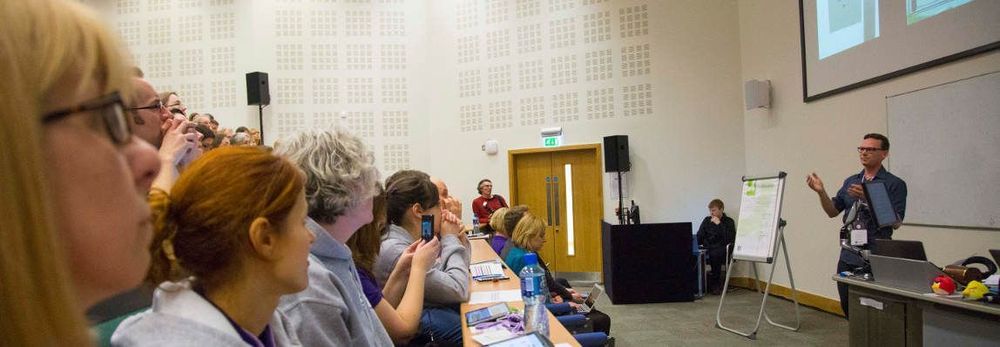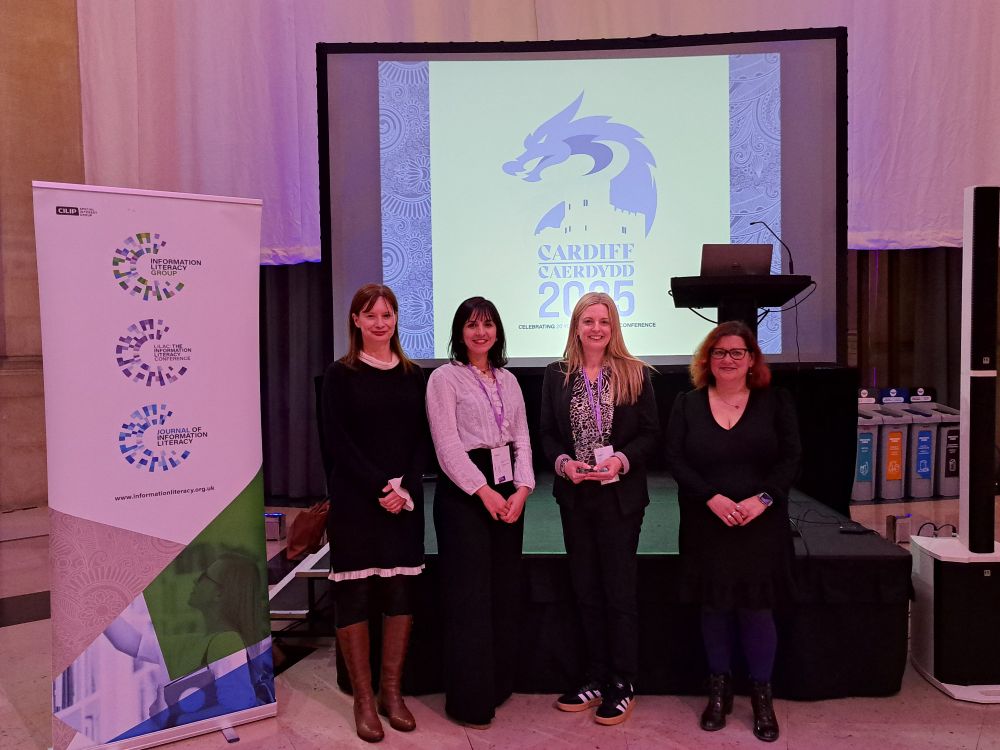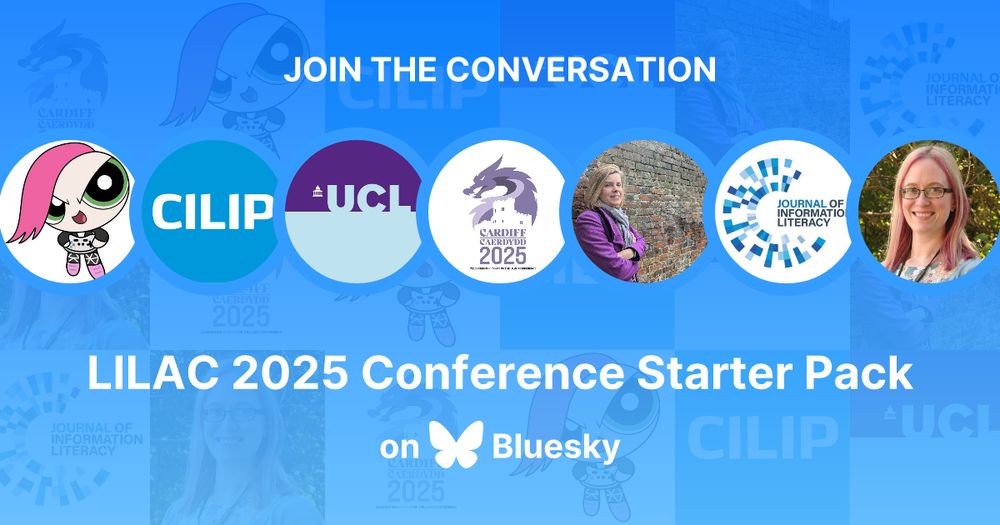Journal of Information Literacy
@jinfolit.bsky.social
2K followers
890 following
75 posts
The Journal of Information Literacy is the international, peer-reviewed, diamond open access journal of CILIP’s Information Literacy Group. Our comms do not represent CILIP policy. https://journals.cilip.org.uk/jil/index #InfoLit #OpenAccess 💎🔓
Posts
Media
Videos
Starter Packs
Reposted by Journal of Information Literacy
Reposted by Journal of Information Literacy
Alison Hicks
@alisonhicks0.bsky.social
· Aug 22
Reposted by Journal of Information Literacy
Reposted by Journal of Information Literacy
Reposted by Journal of Information Literacy
Jess
@bookelf.bsky.social
· Apr 22
Reposted by Journal of Information Literacy
Reposted by Journal of Information Literacy
Sheila Webber
@sheilawebber.bsky.social
· Apr 14

#LILAC25: I I can show you the (life)world: Qualitative techniques to examine women’s information experiences Laura Woods
Pam McKinney here live-blogging from day one of the LILAC information literacy conference in Cardiff, and I'm excited to be blogging this presentation from Laura Woods (@woodsiegirl.bsky.social), who Sheila and I have the honour of supervising at the University of Sheffield Information School. The presentation focuses on the methodology and preliminary findings from Laura's PhD study. Laura worked as Engineering subject librarian at the University of Huddersfield and has for a long time been interested in how engineering students engage with information in their studies. The information behaviour of females has been an under-studied phenomenon generally, and hasn't been studied in the context of engineering students. Laura defined information experience as a bridging concept to look at the intersection between information literacy and information behaviour, with information literacy being an applied concept and information behaviour as a research concept. The lifeworld is a concept from phenomenology that encompasses how we interact with the world that we often don't always recognise.
Laura had a qualitative research design and aimed to recruit 15-20 participants from four different universities who represent a variety of backgrounds and experiences. Participants were asked to create an information diary in any format they wanted (e.g. photos, text diary etc) and then they were invited to a semi-structured interview to discuss their diary. Participants were recruited through engineering departments at each of the four universities, this was deliberate because there can be backlash from research focusing on gender in engineering. Email invitations were sent to all female students in each department. Participants were offered £30 incentive to take part which represented 2.5 hours at the UK living wage. Students who were interested in taking part completed a demographic questionnaire, and this enabled Laura to recruit participants from a variety of backgrounds and with a variety of characteristics. Diary periods ranged from 2-6 weeks, most people kept a text diary, some added photos, one person kept a voice note diary. Some diaries were very detailed, others were just a few bullet points for each entry.
Initial findings from the pilot study (4 participants) revealed that participants experienced sexism and sexist micro-aggressions, but these were often downplayed. Group work was a common site for sexist attitudes and behaviours e.g. participants were blocked from taking on more technical tasks, or being asked to make a presentation "pretty". Participants had a preference for video-based learning materials and didn't talk about academic literature. The library was mentioned but only as a place of study, not a source of information. There was a strong reliance on lecture notes. People emerged as an important source of information - this mirrors the information behaviour of practising engineers. Often the person approached for information or help was carefully selected because to ask for help or information made participants feel vulnerable and ill-informed.
There was a lot of use of shared documents by participants to lead or control a group project, to make sure that all group members were contributing, and stop information hoarding by other group members. The participants seemed to have devised this strategy independently. AI was brought up by every participant (unprompted). All were using AI, but probably not in ways that would be problematic from an academic integrity perspective. They mostly used AI to help them understand a problem or a concept that they didn't really understand. They say ChatGPT is a conversational study partner, partly because they felt they couldn't approach other students on their course for this chat. They were aware of the limitations of AI in terms of information hallucination.
Some reflections: Laura found it very useful to keep her own information diary, this helped give her clarity about what she was asking her participants to do, and it also gave her examples of an information diary to share with her participants. It was really important to pay participants for their time. It was important to be led by participants' needs and preferences e.g. diary format and online or f2f interview. Laura prepared a distress protocol, and this was important as some of her participants became distressed, Laura was able to draw on this to protect both her participants and herself.
Photo: Dragon sculpture in Cardiff
dlvr.it
Sheila Webber
@sheilawebber.bsky.social
· Apr 14

Day 1, afternoon session #lilac25: The Role of Emotion in Access to Information on Reproductive Health, Illness, and Disability: Implications for Information Literacy Instruction
Natalia Kapacinskas and Veronica Aellano Douglas from the University of Houston Libraries presented their work to explore the intersections between emotions, information access and information literacy and how that relates to information seeking for reproductive health. "emotion" is a complicated concept, it is an affective phenomenon which is discrete which suggest the existence of 6 or more basic emotions (e.g. sadness, happiness, surprise) or continuous as in they exist on a spectrum. Appraisal theory has become used to try to explain emotions as a functional state that prompts behaviours. This is related to information behaviour in that how does emotion support or prompt an information search. They take a social-constructivist perspective in their work.
Both authors are interested in disability, illness and reproductive health and the emotions associated with them, which seem to be inconsistent with traditional views presented in academic sources. For example, there is a narrative that disabled people should be "inspirational" to others, and families should be "disappointed" by disability and illness in their children. There is a narrative around "persistence" and "control" in relation to chronic illness. Reproductive health is associated with "determination" and a happy ending when challenges are overcome: there is always "hope". These narratives don't always reflect the reality of the emotional experiences of the people who have chronic illness, disability or reproductive health problems. There are "unacceptable" emotions such as frustration, violence, confusion, fear, shame anger and guilt. The prevailing narratives affect the information that is published, and therefore what information is available to be found.
Information marginalisation is the systemic process that pushes people to the margins of society, where their needs are overlooked. The presenters propose that social expectations of emotion exemplify information marginalisation, and this affects how people search for information. Information behaviour models do encompass aspects of emotion, but they don't consider the emotions of the researcher towards the topic, only the information search process itself, and this contributes to information marginalisation. The literature on health information seeking is a little more connected to emotions, however, information literacy models are not based on this literature and tend to assume that successful research requires controlled emotions. Holocaust librarianship, Indigenous information literacy and emotionally engaged research are more aligned with looking at the whole person and acknowledging these unpleasant emotions that might be rooted in a person's history or cultural situation. We need to take emotions, and their social and cultural context into account when designing information literacy teaching. For example, librarians need to recognise that the way information is sought might be influenced by defensive behaviours e.g. selected disclosure to protect a child from scrutiny. Online communities can provide a way to seek and share information from outside the traditional medical establishment.
It is also important that librarians recognise their own emotional reaction to these health and illness-related topics and look inward to consider how best to support a researcher. This was a really thought-provoking presentation, which encouraged me to reflect on the relationship between emotion and information literacy.
Photo: Tree in bloom in Cardiff city centre
dlvr.it
Reposted by Journal of Information Literacy
Reposted by Journal of Information Literacy
Reposted by Journal of Information Literacy
Chao Wang
@andrewwong95.bsky.social
· Mar 29







